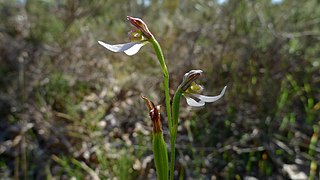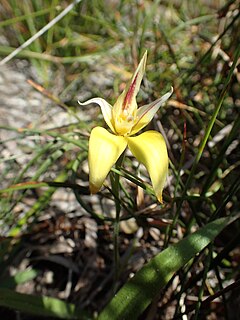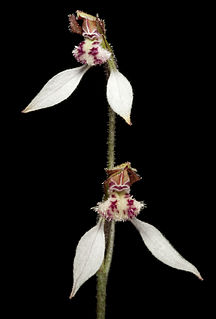
Eriochilus, commonly known as bunny orchids, is a genus of flowering plants in the orchid family, Orchidaceae that is endemic to Australia. Orchids in this genus are distinguished from those in the similar Caladenia by having a glabrous leaf and a densely woolly labellum. Species occur in south-west Western Australia, South Australia, Queensland, New South Wales, the Australian Capital Territory, Victoria, and Tasmania. Their common name alludes to their prominent ear-like lateral sepals.

Caladenia attingens, commonly known as mantis orchids, are plants in the orchid family Orchidaceae and are endemic to the south-west of Western Australia. There are three subspecies, each of which has a single hairy leaf and one or two brightly coloured flowers with upswept sepals and a labellum with long, comb-like fringes. The subspecies differ in size, distribution and habitat.
Caladenia bicalliata subsp. bicalliata, commonly known as the limestone spider orchid or dwarf limestone spider orchid, is a plant in the orchid family Orchidaceae and is native to the south-west of Western Australia and coastal areas of South Australia. It has a single erect, hairy leaf and one or two cream-coloured flowers with reddish-brown tips.

Caladenia exilis subsp. exilis, commonly known as the salt lake spider orchid, is a plant in the orchid family Orchidaceae and is endemic to the south-west of Western Australia. It is a relatively common spider orchid with a single erect, hairy leaf and up to three white to greenish-cream flowers with a small white, red-striped labellum.

Caladenia flava subsp. sylvestris, commonly known as the karri cowslip orchid, is a species of orchid endemic to the south-west of Western Australia. It has a single, hairy leaf and up to three pale yellow and cream-coloured flowers which are white near the tips of the sepals and petals and marked with bright red or pink.
Caladenia graniticola, commonly known as the Pingaring spider orchid, is a species of orchid endemic to the south-west of Western Australia. It has a single, hairy leaf and one or two yellowish-green, red and white flowers which have a greenish-yellow and white labellum with a red tip. It was originally described as Caladenia hoffmanii subsp. graniticola but has a slightly different labellum and column.

Caladenia longicauda subsp. crassa, commonly known as the Esperance white spider orchid, is a plant in the orchid family Orchidaceae and is endemic to the south-west of Western Australia. It has a single hairy leaf and up to three mostly white flowers with long, broad, spreading lateral sepals and petals, a relatively broad labellum with short, narrow teeth. It grows on the south coast between Bremer Bay and the Cape Arid National Park.

Caladenia applanata subsp. applanata, commonly known as the broad-lipped spider orchid, is a species of orchid endemic to the south-west of Western Australia. It is a relatively common orchid with a single erect, hairy leaf and up to three flowers which may be red, cream, green or yellow and have a broad, flattened, red-tipped labellum.
Caladenia longicauda subsp. extrema, commonly known as the late white spider orchid or Seaton Ross spider orchid is a plant in the orchid family Orchidaceae and is endemic to the south-west of Western Australia. It has a single hairy leaf and one or two mainly white flowers with long, mostly spreading lateral sepals and petals. It is a relatively rare orchid which is similar to the tangled white spider orchid but has larger flowers and a later flowering period.

Eriochilus helonomos, commonly known as the swamp bunny orchid, is a plant in the orchid family Orchidaceae and is endemic to Western Australia. It has a single pointed leaf and usually a single white or cream-coloured flower with reddish brown markings. A relatively common species, it usually grows in swampy places. It is distinguished from other bunny orchids by the arrangement of its petals.

Eriochilus dilatatus subsp. dilatatus, commonly known as the white bunny orchid, is a plant in the orchid family Orchidaceae and is endemic to Western Australia. It has a single narrow leaf and up to seven greenish and white flowers with reddish or mauve markings. A widespread and common species, it grows in a range of habitats and flowers prolifically after fire.
Eriochilus dilatatus subsp. brevifolius, commonly known as the blunt-leaved bunny orchid, is a plant in the orchid family Orchidaceae and is endemic to Western Australia. It has a single small, smooth leaf with wavy edges and a pale red lower surface, and up to three greenish and white flowers with red or mauve markings. It is distinguished from the other subspecies by the colour of the lower surface of its leaf and by its later flowering period.
Eriochilus dilatatus subsp. magnus, commonly known as the Easter bunny orchid, is a plant in the orchid family Orchidaceae and is endemic to Western Australia. It has a single large, smooth, flattened leaf and up to twenty five dull green, red and white flowers. It is found in high rainfall areas between Perth and Albany.
Eriochilus dilatatus subsp. orientalis, commonly known as the eastern bunny orchid, is a plant in the orchid family Orchidaceae and is endemic to Western Australia. It has a single short, smooth, flattened, egg-shaped leaf and up to seven dull green, red and white flowers on a fleshy flowering stem. It only occurs on the coast near Caiguna.

Eriochilus dilatatus subsp. undulatus, commonly known as the crinkle-leaved bunny orchid, is a plant in the orchid family Orchidaceae and is endemic to Western Australia. It has a common orchid in the wheatbelt and has single narrow egg-shaped leaf with wavy edges and a maroon underside. Up to three dull green, red and white flowers are borne on a wiry flowering stem.

Eriochilus dilatatus, commonly known as the white bunny orchid, is a plant in the orchid family Orchidaceae and is endemic to Western Australia. It is a common and widespread, slender ground orchid with a single leaf and up to fifteen small white and greenish flowers with reddish or brownish markings and a hairy labellum.
Eriochilus pulchellus, commonly known as the granite bunny orchid, is a plant in the orchid family Orchidaceae and is endemic to Western Australia. It has a single egg-shaped leaf and up to ten small white flowers with red markings. A relatively common species, it grows in shallow soil on granite outcrops. Its fleshy leaf is held above the ground on a thin stalk.

Eriochilus scaber is a plant in the orchid family Orchidaceae and is endemic to Western Australia. It has a single leaf and up to three small red, pink and white flowers. Two subspecies are recognised based on the shape of the leaf and its height above the ground.
Eriochilus tenuis, commonly known as the slender bunny orchid, is a plant in the orchid family Orchidaceae and is endemic to Western Australia. It has a single egg-shaped leaf lying flat on the ground and one or two small pink or pink and white flowers. A common species, it grows in dense, shrubby forest and in winter-wet swamps.
Eriochilus valens, commonly known as the red-lipped bunny orchid, is a plant in the orchid family Orchidaceae and is endemic to Western Australia. It has a single egg-shaped leaf held above the ground and up to four small pink or white and pink flowers. It grows near winter-west swamps and usually only flowers after fire the previous summer.








